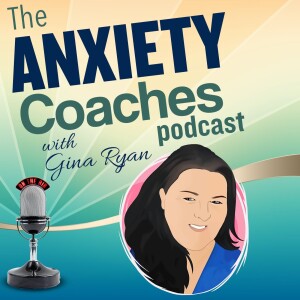
985: Classic ACP Reduce Anxiety By Teaching Your Body To Relax On Purpose
 2023-12-10
2023-12-10
In today's episode, Gina knocks one out of the park with highly useful knowledge about how to reduce anxiety by training your body to relax at will. The problem of anxiety is defined, then steps and methods to become able to use your body's physiology to your advantage and overcome anxiety are provided.
Please visit our Sponsor Page to find all the links and codes for our awesome sponsors!
https://www.theanxietycoachespodcast.com/sponsors/
Thank you for supporting The Anxiety Coaches Podcast.
Find even more peace and calm with our Supercast premium access membership! https://anxietycoaches.supercast.com/
Here's what's included for $5/month:
❤ New Ad-Free episodes every Sunday and Wednesday
❤ Access to the entire Ad-free back-catalog with over 600 episodes
❤ Premium meditations recorded with you in mind
❤ And more fun surprises along the way!
All this in your favorite podcast app!
To learn more go to:
https://www.theanxietycoachespodcast.com
Join our Group Coaching Full or Mini Membership Program
Learn more about our One-on-One Coaching
What is anxiety?
Quote:
Sometimes the most productive thing you can do is relax.
–Mark Black
Chapters0:00:24 Introducing the importance of relaxing anxiety on purpose
0:01:22 Understanding the body's tension response in anxiety
0:02:20 The fight, flight, or freeze response for survival
0:03:22 Living Longer: The Impact on Work and Stress
0:04:31 The Price of Daily Tension: Health Problems Arise
0:06:15 Relaxation: Shifting from Reaction to Response
0:07:32 The Benefits of Relaxation and Easy Ways to Achieve It
0:09:34 Routine Relaxation Tips for the Body
SummaryIn this episode of the Anxiety Coaches Podcast, we dive into the importance of intentionally relaxing our bodies to reduce anxiety. It's easy to overlook the intentional aspect of relaxation, but when we are consistently tense due to anxiety, we need to actively train our bodies to relax. Our natural response to stress or upset is to tense up, a survival mechanism passed down from our ancestors. However, in today's world, this constant tension can lead to serious health issues. So, it's essential to use our minds and brains to help us break free from the survival mode and find relaxation.
Relaxation is the key to reducing tension, as it is the antithesis of tension. Studies have even shown that regularly practicing relaxation can improve the expression of genes that control our fight or flight stress response. This means that intentional relaxation has the potential to change our stress response from a reactive one to a more controlled response.
Apart from its health benefits, relaxation also feels great and is something we all crave. But how do we send the relaxation message to our brains? It starts by focusing on the body. Establishing a routine and regularly practicing body-focused relaxation is crucial, as change takes time and repetition.
One simple technique is to consciously relax our tongues and jaws, which tend to be tense and tight. By taking a moment to notice and relax our tongues, we can promote a sense of overall relaxation. Additionally, touching our lips with clean hands can also send a calming message to the brain.
Opening our lips slightly instead of keeping them pursed together is another technique that encourages physical relaxation and a sense of calm. Taking long exhales can be incredibly effective, as slowing down our breathing and focusing on longer exhales signals to the brain that everything is okay.
Engaging in intentional relaxation exercises is vital. Making a fist and then intentionally relaxing it communicates to the brain that we are safe. Moreover, recalling the feeling of being with someone who cares about us, whether a human or a pet, can generate a profound sense of peace and shift us away from fight-or-flight mode.
Learn more about your ad choices. Visit megaphone.fm/adchoices
More Episodes
 2023-12-13
2023-12-13
Create your
podcast in
minutes
- Full-featured podcast site
- Unlimited storage and bandwidth
- Comprehensive podcast stats
- Distribute to Apple Podcasts, Spotify, and more
- Make money with your podcast
It is Free
- Privacy Policy
- Cookie Policy
- Terms of Use
- Consent Preferences
- Copyright © 2015-2024 Podbean.com


